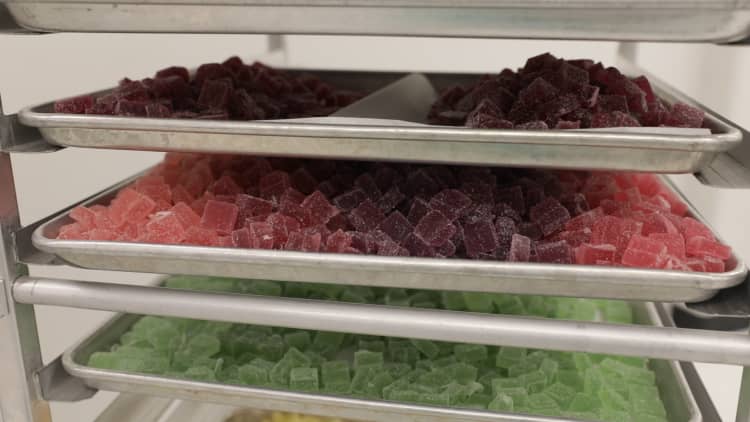The woman who sells more legal marijuana edibles than anyone else in Colorado has a name which sounds a bit like a mashup of famous fictional drug dealers. Nancy Whiteman might make you think of pot dealer Nancy Botwin from HBO's "Weeds," or meth maker Walter White from "Breaking Bad"; but Whiteman would be the first person to tell you her life isn't nearly as exciting.
"I'm always joking with people that I really have to come up with a better back story," she laughs.
Unlike Botwin and White, Whiteman is not a law breaker ... except in the eyes of the U.S. federal government.
Whiteman, 60, is co-founder and CEO of Wana Brands, a manufacturer of cannabis-infused edibles based in Boulder, Colorado. Wana (short for "marijuana") specializes in gummies. The candies don't look like gummy bears or worms — that's illegal in the state (too appealing to kids). Wana candies are small squares or circles dusted in sugar. They are vegan, and they are delicious. This reporter had never tried any marijuana ever (honest), nibbled some Wana product to see how it tastes. More on that later.
But really, how did a senior marketing executive end up in a business like this?
"Unlike many other people who I admire and respect in this industry, I didn't come to the industry from an advocacy background," Whiteman says. "I really was mostly intrigued with it as a business opportunity."
From corporate to cannabis
Nancy Whiteman's career started out about as corporate as you can get. She has an MBA from the University of Massachusetts Amherst and spent years as the vice president of marketing for a large financial services company in the Northeast. About 20 years ago, she moved to Colorado, where she ran her own marketing consultancy company.
Then ... she got into the pot business, as the state began rolling out legal cannabis (medical marijuana was legalized in Colorado in 2000).
"I like to say I went from the most traditional industry to the least traditional industry," Whiteman says.
The father of her daughter's friend was trying to infuse sodas with cannabis in 2010 and Whiteman briefly partnered with him before she and her then-husband, John Whiteman, decided to create their own company centered around treats infused with THC, cannabis' active compound.
"I wanted to make something, I wanted a business where I could build value, and it didn't depend on me," she says. "I also love to cook."
They scraped together around $50,000 to $60,000 to form Wana Brands. "We bootstrapped it ourselves."
Even though people had been making pot brownies forever, the edibles market in 2010 wasn't big in Colorado. Whiteman estimates pot-infused treats only made up 10 to 15 percent of a dispensary's sales.
"When we first started the company, and I would walk into dispensaries and talk to people, 'Oh, we're starting a new line of edibles,'" Whiteman says, "and people would practically be yawning in my face. They could [not] care less."
Times were tight.
"We had many payrolls where we were writing personal checks to cover the payroll."
Then everything changed
That all changed in 2014 with legalization of the recreational market in Colorado. Pot was no longer legal only for medicinal purposes. Anyone over 21 could buy it for any reason.
Suddenly edibles became very popular, especially with people new to cannabis who didn't want to smoke. They were also a discreet way to consume pot, as it was illegal to use weed publicly.
"You can eat a gummy and nobody knows you're consuming cannabis," Whiteman says.
Sales skyrocketed, from around $100,000 the first year to $14.5 million in 2017, according to Whiteman. They are on track to top $16 million, making Wana the most successful edibles manufacturer in the state. Wana's recreational sales are three to four times that of its medical products.
However, with the popularity of edibles came some unintended consequences. It takes longer to feel the effects of cannabis when eating it versus smoking it, and that led to people consuming too much. A story by Maureen Dowd in the New York Times in 2014 brought national attention to the issue, as Dowd said she ended up paranoid and unable to move in her Denver hotel room after eating an entire candy bar. She had no idea how much THC she was consuming.
After that, Colorado led the way to create rules for edibles, like how much THC could be in each individual piece. Products had to be tested for potency, and they had to be sold in child resistant packaging. Edibles could also no longer look like well-known candy or cookie brands, to avoid confusion. Whiteman supports the changes, even though they were costly.
"We had to completely, completely revamp how we were producing our products...it cost us hundreds and hundreds of thousands of dollars," she says.
The changes also brought about an end to certain products Wana created. Gone was the caramel which was too soft to hold the new mandatory official THC stamp or the nuts dusted with cannabis sugar — they just couldn't control the range of THC on each individual nut, so had to kill the product.
"They were delicious," she says with a sigh.
That said, she thinks the regulations have made edibles a safer market. She's says it's up to parents to keep unsafe products away from their children.
"People are going to make edibles," she explains. "When you make an edible at home, you have no idea what the potency is, I don't think you're going out and getting a child resistant package. That's the dangerous situation."
Mistakes happen
Whiteman admits to making a few mistakes along the way, though one actually turned out to be a blessing.
Wana has never grown its own pot; it always buys trim (the leaves used to infuse products with THC) from a licensed grower. In the early legal days in Colorado, however, this put them at a disadvantage, as most manufacturers were growing their own. In fact, to get a license to grow back then, you had to already be a manufacturer or own a dispensary.
"That meant we were living in a very constrained environment for trim."
However, in 2014, when recreational marijuana became legal, licensed growers could just grow, they didn't need to be part of a vertically integrated business.
"Plant material became much more abundant," says Whiteman, "and now we can purchase it for much less than we could have grown it for."
Other mistakes, however, have not been blessings.
Whiteman says more than once during the interview that her biggest challenge has been related to "people and partnerships." The company recently settled a lawsuit filed by LP Capital, a smaller company which makes vape cartridges. The suit claimed that Wana and Whiteman stole business secrets and reneged on plans to buy LP. (Both parties say they are happy with the settlement: Whiteman says its value proves Wana did nothing wrong, while Gabe Fenton, president of LP, calls the settlement a validation of his company's efforts.)
Then there were the products which didn't exactly light up the industry.
"We got this recipe for making a chewing gum, and we never made it taste very good," she says. There was also the cannabis beef jerky. "It was actually a popular product, but I'll tell you, making it was pretty 'blech,'" she grimaced.
The taste test
This reporter wanted to know what the gummies taste like. After receiving permission from CNBC to nibble them purely for that purpose, Nancy Whiteman set me up with some.
I sampled several "normal" gummies and lozenges made by Wana for the taste test, which did not have any THC in them, in flavors like blueberry and watermelon. They were delicious. Why doesn't Whiteman sell these? She jokes the profit margins are too small in regular candy, and there's too much competition.
Then I took a nibble of a few pieces of the same candy which contained THC.
"Start low and go slow," Whiteman warned, which is what people tell a lot of first-timers consuming edibles.
The marijuana gummies I tasted had 2.5 mg to 5 mg of THC in each piece. The THC gummies tasted exactly the same as the regular gummies, though I did eventually notice a very slight grassy hint on the finish. If one didn't know the candies had pot in them, one might not even notice it. (By the way, I consumed so little that I felt merely a bit relaxed 40 minutes later. Sorry, no Maureen Dowd horror stories here.)
Business grows despite divorce
Here's another unique twist to Whiteman's career. Not long after she launched Wana Brands with her husband, their marriage fell apart. She and her ex decided to remain business partners.
"It is different," she quietly admits about the situation, seeming uncomfortable addressing the topic. "You have to put the interests of the business first," she says. "It certainly helps if you basically have a relationship where you have good communication. I certainly wouldn't recommend it for anybody who's in active conflict with each other, or who has problems communicating in general."
They've made it work. Wana Brands has 85 employees and operates in four states: Colorado, Oregon, Nevada and Arizona (where medical marijuana is legal). Illinois and Florida (marijuana is decriminalized in the former and legal for medical purposes in both states) are about to come on board. However, since marijuana remains illegal under federal law, product cannot cross state lines. Therefore, Whiteman's team has had to create separate enterprises in each state.
That's created its own challenges. "Candy is very sensitive to humidity and it's very sensitive to altitude." Wana's recipes need to be tested and tweaked each time the company moves into a new state.
But why isn't Whiteman selling in the biggest marijuana market in the country, California?
"California is a very complex market right now," Whiteman says. The move from the black market and the well-established medical market there is taking longer. People are less willing to transition and pay the taxes. "We're certainly talking to many potential partners in California," Whiteman says about the future. "We will be there."
Women in the pot biz
There have been many stories, including some by this reporter, highlighting the prevalence of women in the cannabis industry. Nancy Whiteman has a more nuanced view of the opportunities. She sees a lot of women in the business in states out west "where there's not a limit on the licenses, and there are relatively lower barriers to entry."
However, in states where fewer licenses are granted, like Pennsylvania, Maryland, or Massachusetts, "The picture starts to look different, it tends to be more male led," she says. "They're having to raise money and raise capital and put together investor groups, and I think in those situations, I see a lot less women, which is a little sad."
So you wanna get in the marijuana business?
Even though legal cannabis is still an incredibly young industry, it's mature enough that Whiteman isn't sure she could start her business today with only $50,000. Still, she encourages those who are thinking of entering a relatively new market like hers to just do it.
"We didn't spend any money initially on market research," she says. "My market research was making things, putting it out in the marketplace and seeing what the market liked and didn't like."
An interesting strategy from a woman who has an MBA with a focus on marketing, but Whiteman admits her advice might be counterintuitive.
"I know there would be lots of people that would say, 'Sit down and put together a business plan, and plan it all out for five years.'" Nancy Whiteman believes in a new industry, that's a waste of time. "I'm more of a 'one step forward' philosophy. Try it. See what happens."
More from Strange Success: How this dad's hairy back made him a millionaire
Like this story? Check out the Strange Success podcast.

This story has been revised to included updated information about the lawsuit brought by LP Capital against Wana Brands.






